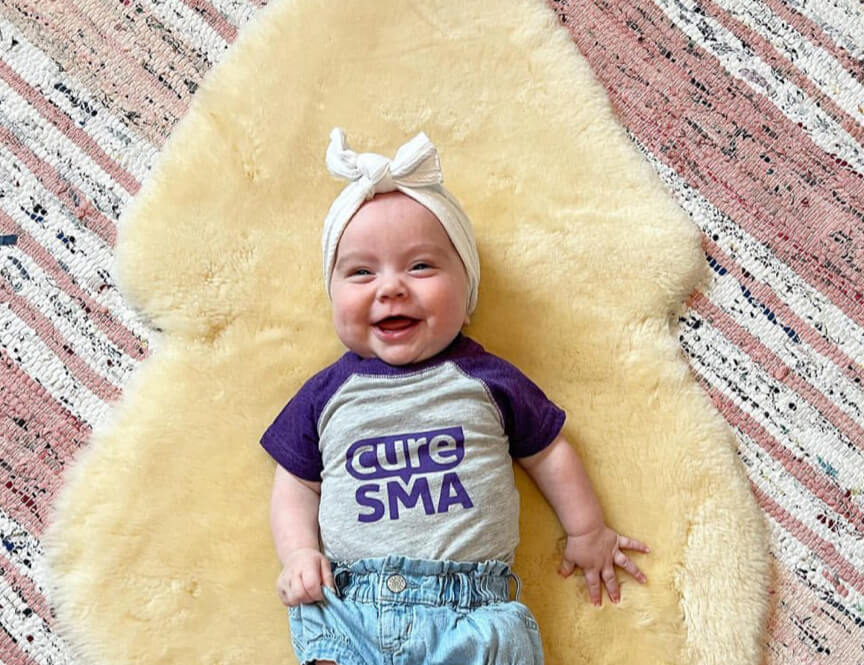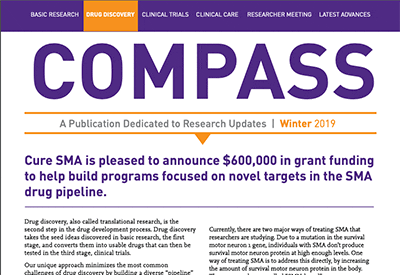Cure SMA has awarded a $140,000 research grant to Arthur Burghes, PhD, at The Ohio State University, for his project, “Defining the contribution of RNP assembly pathways to the SMA phenotype.”
Because of a genetic mutation in the SMN1 gene, individuals with SMA don’t produce survival motor neuron protein (SMN protein) at high enough levels. We know this causes motor neurons to shrink and eventually die, but researchers are also looking at the other effects the loss of SMN protein has on the body. Understanding how the loss of SMN protein affects the body could reveal more about where and when the protein is needed in order to effectively treat SMA.
Dr. Burghes’ project will look closely at the cellular function of SMN protein, hoping to learn more specifically about what SMN does to a cell to help it function.
Meet Dr. Burghes
Who are you?
I am Professor of Molecular & Cellular Biochemistry (also on the staff of the Departments of Neurology and Molecular Genetics) at The Ohio State University. I am also a 1984 graduate of the University of London, where I did my research at The Jerry Lewis Muscle Research Centre under the direction of Dr. Michael Dunn and Professor Victor Dubowitz. The focus of my research as a graduate student in London, and later as a post-doctoral fellow at the Hospital for Sick Children in Toronto was Duchenne muscular dystrophy. I was involved in positional cloning of the gene for DMD while working Dr. Ron Worton’s lab in Toronto, and realized while still a graduate student, that these techniques could be applied to SMA.
How did you first become involved with SMA research?
While working on my graduate research at the Hammersmith Hospital, I had contact with clinicians and attended regular pathology conferences conducted by Prof. Dubowitz, his residents and fellows in pediatrics and neo-natal medicine. It occurred to me that SMA could benefit from the research approaches being developed for DMD. It was not until I started my own lab at OSU in 1988 that I was able to pursue my interest in SMA research. I have never looked back.
What is your current role in SMA research?
Along with the many graduate students, post-docs and research scientists who have passed through my lab (some of whom still work on SMA), I was involved in mapping the gene for SMA as well as characterization of SMN in various ways; created the mouse model of SMA that has been distributed worldwide for use in SMA research; identified chemical compounds and other types of therapies with potential therapeutic benefit. The majority of the professionals who trained in my laboratory are still active in SMA research. I hope that I have inspired their dedication to this worthy cause.
What do you hope to learn from this research project?
The project objective is to determine the cellular function of the SMN protein that causes SMA. SMN protein is known to function in the cellular process call RNA protein assembly. This project hopes to define RNA protein assembly as the critical pathway that is disrupted in SMA when SMN protein levels are low, as well determining what specific problems this causes. This will facilitate the identification of molecular targets downstream of the assembly pathway to possibly identify new drug targets.
How will this project work?
We will study the function of the SMN protein in cell culture and in mice using SMN mutations that occur in SMA patients.
What is the significance of your study?
The basic biological function of SMN that is disrupted in SMA is not known. Using SMN mutations that occur in SMA patients we can dissect the function of SMN. In turn we can identify genes in the same biological pathway that may serve as novel therapeutic targets.
Basic Research Funding
This grant to Dr. Burghes is part of $890,000 in new basic research funding that we’re currently announcing. Please see below for links to other recent announcements.
Basic research is the first step in our comprehensive research model. We fund basic research to investigate the biology and cause of SMA, in order to identify the most effective strategies for drug discovery. We also use this funding to develop tools that facilitate SMA research.
Past Announcements
$140,000 to Megerditch Kiledjian, PhD
$140,000 to Rashmi Kothary, PhD



